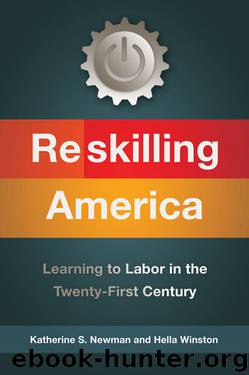Reskilling America: Learning to Labor in the Twenty-First Century by Katherine S. Newman & Hella Winston

Author:Katherine S. Newman & Hella Winston [Newman, Katherine S.]
Language: eng
Format: epub
ISBN: 9781627793292
Publisher: Henry Holt and Co.
Published: 2016-04-19T07:00:00+00:00
German Apprentice in ZF
ZF is a worldwide producer of auto parts; its most important product is the chassis for automobiles; the company supplies Mercedes and BMW, among other auto manufacturers. ZF has 121 production facilities in twenty-six countries. Ten of them are in the United States, including plants in Michigan, Alabama, and South Carolina. Its facility in Lemförde, a municipality in the German state of Lower Saxony, ships 17.3 million euros’ worth of chassis, produced by seventy-five thousand employees. In the Osnabrück region alone, there are forty-five hundred workers, making ZF Lemförde the biggest employer in the area, larger by far than Volkswagen.
Martin Waitz is the senior manager and head of apprenticeship training at the facility in Diepholz, one of the constituent facilities of the Lemförde branch of ZF. He began his career with ZF thirty-five years ago as an apprentice and has risen up in the ranks. He now heads the group that supplies apprentices for all of the ZF plants in the region. There are more than 200 apprentices at any given time; 110 of them are ZF trainees, while approximately another 90 are being trained by ZF for placements in smaller firms who pay the company for their training services—a lucrative side business. Martin’s role is to ensure that all of the apprentices are trained to the point where they are sure bets for permanent positions.
Because ZF is a multinational and a leader in mechatronics and other applications of computer-based technology, its labor needs are on the high-skill side. They are particularly interested in hiring people who can advance the applications of new methods and go beyond focusing simply on increasing the efficiency of the tried and true. Accordingly, ZF encourages a blend of traditional apprenticeship and partnerships with universities. Forty of Martin’s trainees participate in a dual program that links them to a university-based engineering qualification that takes 3.7 years to complete. Tuition is fully paid by ZF and they give students a stipend to boot. Standards are set high and qualifying for this opportunity is demanding, but the rewards are significant, including guaranteed jobs in engineering and management. Apprentices also have the option of enrolling in training modules for six to eight weeks in ZF plants outside of Germany; for anyone expecting to enter a management track, it behooves them to take advantage of this opportunity.
Martin supervises an experienced and highly credentialed training staff of six. All of the ZF trainers are licensed by the national Chamber of Trades, having sat for a rigorous examination after they have had three to four years of teaching experience. As a group, the trainers start the apprentices out in the training center, where they master a common curriculum of machine tools, electrical circuits, and welding, among other things. When they are proficient in these skills, they are sent out into ZF’s plants, of which there are half a dozen in the Osnabrück area, to train with Meisters.
Though ZF is careful in the selection process, every year some ten
Download
This site does not store any files on its server. We only index and link to content provided by other sites. Please contact the content providers to delete copyright contents if any and email us, we'll remove relevant links or contents immediately.
| Administration | Assessment |
| Educational Psychology | Experimental Methods |
| History | Language Experience Approach |
| Philosophy & Social Aspects | Reform & Policy |
| Research |
The Art of Coaching Workbook by Elena Aguilar(48065)
Trainspotting by Irvine Welsh(20055)
Twilight of the Idols With the Antichrist and Ecce Homo by Friedrich Nietzsche(17706)
Fangirl by Rainbow Rowell(7834)
Periodization Training for Sports by Tudor Bompa(7328)
Change Your Questions, Change Your Life by Marilee Adams(6641)
This Is How You Lose Her by Junot Diaz(5773)
Grit by Angela Duckworth(4737)
Red Sparrow by Jason Matthews(4666)
Asking the Right Questions: A Guide to Critical Thinking by M. Neil Browne & Stuart M. Keeley(4576)
Paper Towns by Green John(4169)
Room 212 by Kate Stewart(4107)
Ken Follett - World without end by Ken Follett(3972)
The Sports Rules Book by Human Kinetics(3588)
Housekeeping by Marilynne Robinson(3401)
The Motorcycle Diaries by Ernesto Che Guevara(3332)
Introduction to Kinesiology by Shirl J. Hoffman(3301)
Exercise Technique Manual for Resistance Training by National Strength & Conditioning Association(3292)
Double Down (Diary of a Wimpy Kid Book 11) by Jeff Kinney(3272)
